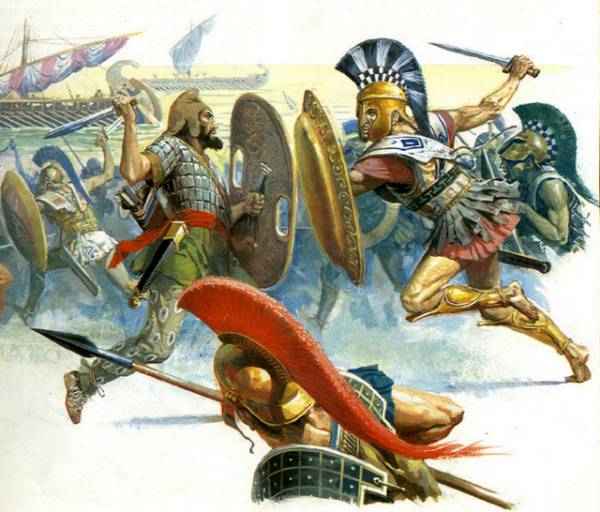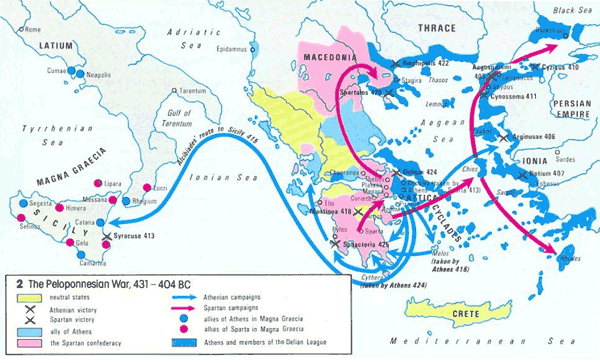Here is some research I am doing on the ancient Greeks and their love of freedom. How a small band of freedom-loving people stood and conquered the mighty Persian empire only to destroy one another in bloody civil wars is one of the keys to political science. In fact, the Five Laws of Decline (FLD), which I teach in my Top 100 All-Time Best Leadership Book RESOLVED: 13 Resolutions for LIFE, predict the downfall of the Greeks. The goal of the LIFE business is to prohibit the growth of the FLD through a performance-based culture where no special deals are allowed. Everyone is paid as they perform—period!
Harry Truman once said, “There is nothing new under the sun, only the history you do not know.” One of our goals in LIFE is to learn and apply the lessons of history so we don’t repeat its mistakes. Enjoy the article and please share how you avoid the growth of the Five Laws of Decline in your company.
Sincerely,
In 481 BC, 10,000 Athenian warriors at Marathon blocked a Persian army rumored to be over 100,000 strong. Indeed, the Persians were the conquering force of the ancient world, having amassed an empire that included modern day Iran, Iraq, Israel, Egypt, Libya, Turkey, and many more. In contrast, the entire Greek peninsula and islands added together are about 2/3 the size of Portugal. Moreover, the Persians were believed to be invincible in military expeditions, having recently conquered the Ionian Greeks (on the western tip of modern day Turkey) before invading the Greek mainland. In fact, no Greek state had successfully withstood the advance of Persia and many of the mainland Greek states had succumbed to the “earth and water” tribute demanded by Persia signifying Greek subjection to the Persian King. Nonetheless, the Athenian hoplites marched over 26 miles to the plains of Marathon to defend their precious freedoms from Persian tyranny while their families awaited word in Athens.
The ancient Greeks are unique when compared to the Asian people of Persia and Egypt. In truth, the “earth and water” demanded by the Persian King wasn’t entirely unpalatable, allowing the Greeks to live peacefully if they paid their tax tribute and provided military help when the Persian King desired to conquer more territory. While many races and countries chose enslavement and peace, the Greeks, led by Sparta and Athens, chose liberty or death. Politically, because of the unique geography of Greece – no navigable rivers and mountains physically separating communities – instead of one national government ruling over smaller units of sovereignty, Greece consisted of numerous city-state sovereignties that confederated together for defense, religious ceremonies, and sporting competitions. While the rest of the world worshiped God-like kings, surrendering their freedoms like ants within a colony. The Greeks, who lived too close to their kings to be fooled, pledged loyalty instead to their cities and structured monarchies, aristocracies, or even democracies for the benefit of the polis, not the political leader. By separating their religion from their King, the Greeks began to see each other as equals before the city-state’s laws, not serfs before God’s regent on earth. The effect of this revolutionary mindset is what led the Athenian’s to fight at Marathon. In other words, they valued their freedoms more than they valued living under slavery.
The Athenian Greeks defeated the Persians on the plains of Marathon, thanks to the courageous leadership of Miltiades. Several years later, the Greeks confederation defeated the Persians again in the naval battle at Salamis, capitalizing on the leadership strategy of another Athenian hero, Themistocles. Rarely, does one find a people like the Athenians, who willingly surrendered their city to Persian destruction, taking the citizens to the island of Salamis and the men into the ships to defend their city-less country. The Greeks didn’t just speak about the value of freedom; they lived it out in their lives. With the final defeat of the Persians on the Boetian plains, led by the Spartan King Pausanius, the Greeks were finally safe from Persian tyranny. Freedom loving people conquered against overwhelming odds thanks to great courage, leadership, and strategy. But this happy story doesn’t end so well. The Greeks, who had so bravely united to defend Greece, ended up destroying one another in a series of fratricidal wars that left mainland Greece exhausted and vulnerable to Macedonian empire building.
What went wrong? How could a people who valued freedom so highly destroy one another, consequently, losing their freedom? The answer is the Five Laws of Decline. The Greeks were the first people to quest after political concord. History has proven concord is a difficult objective since it lies between the Scylla and Charybdis, rocks of chaos on one side and coercion on the other. Before Greece, the history of human civilization is a litany of kings using absolute power to enforce obedient submission of his subjects or lack of absolute power creating chaos and war until a King built enough power to rule his subjects again. Accordingly, in studying the Greek failures, keep in mind that, in the history of the West, this was the first community to attempt a political solution of concord between chaos and coercion. With no historical precedents before them, the Greeks sailed blindly into uncharted seas, confident that they could solve human civilization’s dilemma. After all, hadn’t they just defeated an alleged invincible power and displayed a fierce defense of freedom and all it entails?











 The question of the day for any would-be champion is: Who is in charge in the battle for the brain? When I hear that answer, I can easily predict how well he or she will do with the principles start starting and quit quitting. Like I said previously, success is simple, but it’s not easy because it demands that a person win the battle for the brain. Well, what are you readers waiting for? Let the battle begin.
The question of the day for any would-be champion is: Who is in charge in the battle for the brain? When I hear that answer, I can easily predict how well he or she will do with the principles start starting and quit quitting. Like I said previously, success is simple, but it’s not easy because it demands that a person win the battle for the brain. Well, what are you readers waiting for? Let the battle begin. 



